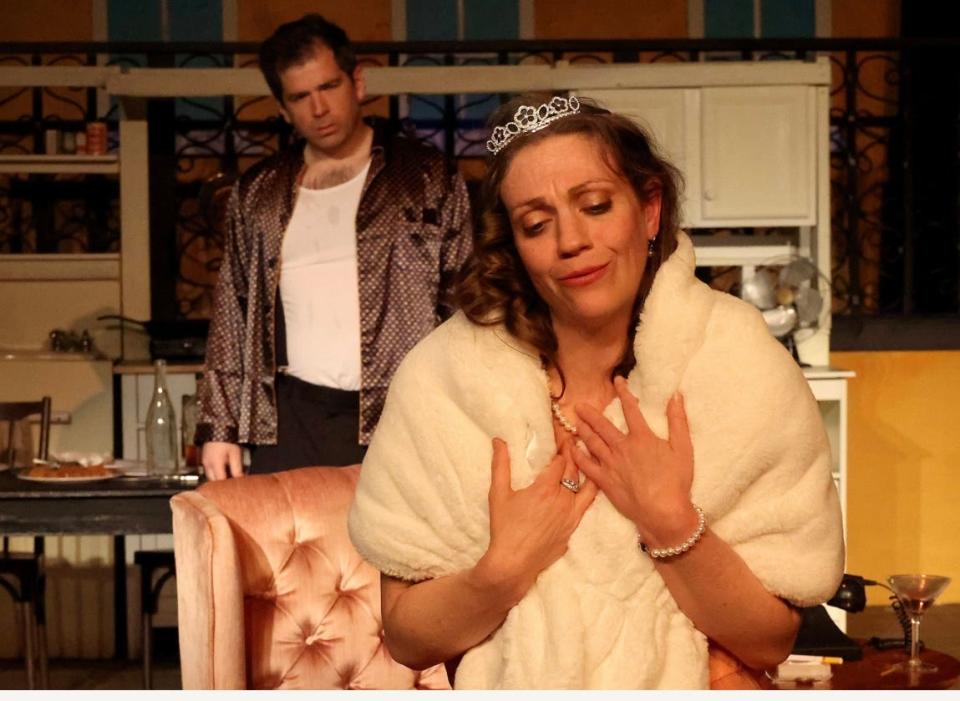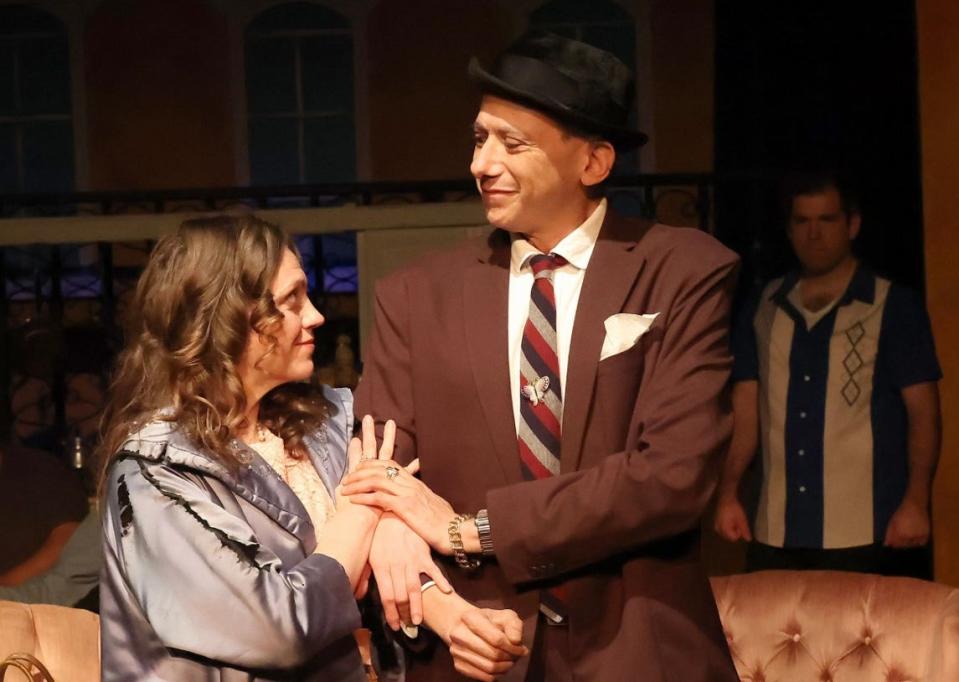Review: Academy's 'A Streetcar Named Desire' in Orleans captures searingly sad descent
- Oops!Something went wrong.Please try again later.
- Oops!Something went wrong.Please try again later.
The show: “A Streetcar Named Desire,” by Tennessee Williams, directed by Judy Hamer, presented by the Academy of Performing Arts.
What it's about: This is one of Williams’ masterful studies of the underbelly of human relationships. Set in a seedy, two-bedroom apartment in post-World War II New Orleans, it lays bare the disintegration and decay of a family and the madness surrounding it.
It all begins when Blanche Dubois (Missy Potash), a one-time Southern belle, arrives at her sister’s apartment battered, beaten and with 65 cents in her purse. She has barely lived through the loss of the family’s fabled plantation, Belle Reve, the deaths of their parents and the disappearance of the myth that was genteel Southern living in small-town Mississippi. (Describing the atmosphere of death at the plantation, Blanche says, “The Grim Reaper had put up his tent on our doorstep; Belle Reve was his headquarters.”)

From the start, Blanche is thrown into the powder keg that is the relationship between her newly pregnant sister Stella (Sam Roderick), and her brutish, whiskey-swilling and poker-playing husband Stanley (Ryan Van Buskirk). Clearly, Blanche isn’t likely to find in this explosive atmosphere the comfort and peace she so desperately needs. Before Blanche even arrives we see Stanley batter Stella, who escapes to friend Eunice’s (Rachel Hischak) upstairs apartment. A semi-repentant Stanley bellows out “Stella” in a moment that has become emblematic of the show. But maybe it’s when Stanley changes his undershirt in front of a newly-arrived Blanche that we know poor Blanche is headed for a rough ride on the streetcar of emotions. She describes the trip into insanity with the following famous line: “What you are talking about is desire, just brutal desire — the name of that rattle-trap streetcar that bangs through the Quarter, up one old narrow street and down another.”
Highlights of the show: At the center of this show is, of course, Blanche and her descent into Hell. Potash ably takes us on that journey, clearly demonstrating her character’s neediness and desperation without overplaying her hand. It would be all too easy to make the aging debutante a caricature. Instead, she uses softly flowing movements and dramatic facial expressions to carry the audience into Blanche’s dismal world. We’re there with her as she begs for Stella’s approval with the line, “You haven’t said a word about my appearance.” And, describing the effect of the death of her young husband, Allan, she says, “After the death of Allan, intimacies with strangers were all I seemed able to fill my empty heart with.”
Roderick and Van Buskirk build the dramatic edifice around the suffering Blanche with the latter offering a clear view of the pure degradation that thrives in the little apartment. Toward the end of the show, he brutally throws Blanche over his shoulder and carries her to the bedroom with the line, “We’ve had this date from the beginning Blanche.”

Go or No Go: Go for a view of Williams’ dramatic brilliance. But be warned that, while there is a small sense of redemption at the end, as Blanche utters “I have always depended on the kindness of strangers,” this is not light fare. Best to leave the kids at home.
Worth noting: Potash’s costumes are striking symbols of her character’s decline. Particularly effective is an old, tattered gown she wears toward the end.
One more thing: The arena-style theater is well-suited to a show like this that’s set in one room. The expanded view gives the audience the sense of being there in the action, rather than just observing.
An interesting note: It’s impossible not to see Marlon Brando in the role he immortalized as Stanley. And there’s an interesting piece of Cape theater history about the Hollywood legend. It is said that he hitchhiked to Provincetown to locate Williams and convince him to cast him in the role. And the rest, as they say, is show business history.
If you go: Through Feb. 26, 7 p.m. Thursdays, Fridays and Saturdays and 2 p.m. Sundays. Academy of Performing Arts, Academy Playhouse, 120 Main St., Orleans, $30 adults, $20 under age 16, 508-202-1952, www.academyplayhouse.org
This article originally appeared on Cape Cod Times: Review: 'A Streetcar Named Desire' at Orleans' arena-style theater

